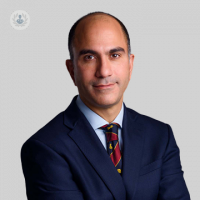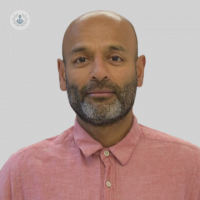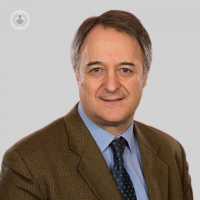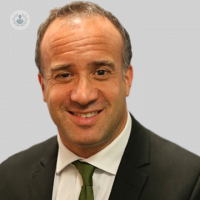The thyroid gland is an endocrine gland located in the front of the neck, below the Adam’s apple. The thyroid is shaped a little like a butterfly, and is responsible for producing hormones throughout your body. The hormones produced by the thyroid help to control such things as the burning of calories in your body, the speed of your body’s metabolism, and regulates the body’s development from birth to old age.
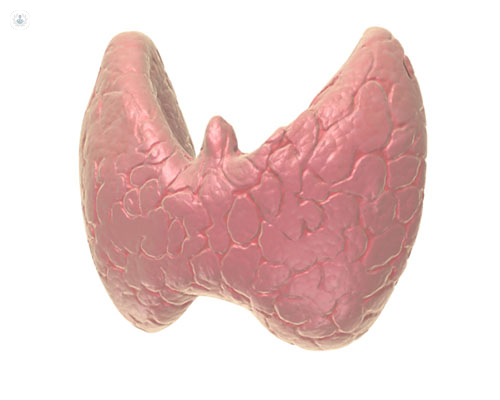
Diseases that can affect the thyroid
There are a number of diseases and disorders that can affect the thyroid, which usually cause either the production of too much or not enough hormones that the body needs, which can lead to other problems elsewhere.
Problems that can affect the thyroid include:
Hyperthyroidism
Otherwise known as overactive thyroid, this condition is when the thyroid gland produces too much of the thyroid hormone. An excess of the hormone can lead to many problems, such as changes in mood, anxiety, tiredness and heart palpitations amongst others.
Hypothyroidism
The opposite of hyperthyroidism, hypothyroidism is when not enough of the thyroid hormone is produced, leading to symptoms of constipation, feeling cold and tired, and difficulty concentrating. If a person is suffering with hypothyroidism at a young age, it can cause problems with growth, delayed puberty, and irregular periods.
Goitre
This is the term used for an enlarged thyroid, and is associated with a malfunctioning thyroid. It can cause symptoms of coughing, difficulty swallowing and even difficulty breathing in some cases.
Thyroid cancer
Thyroid lumps are more concerning in the extremes of age. Thyroid cancer is more common place in smokers and those with a family history of thyroid cancer, though it can affect anyone.
Thyroiditis
This is the general term for an inflamed thyroid. It can refer to a number of conditions such as Hashimoto’s thyroiditis, Postpartum thyroiditis, and Subacute thyroiditis. All of these conditions affect different age groups, and have different kinds of symptoms, though the common symptom is swelling of the thyroid gland.
How are thyroid problems treated?
Treatment for a thyroid disorder varies depending on the type of condition. Some may be treated with medication, where others may require surgery.
Medication can be prescribed to correct the hormone levels produced by the thyroid gland, such as to help produce more hormone in the case of hypothyroidism, or to restrict the amount of hormone produced with hyperthyroidism.
When surgery is required, it will usually involve removal of part of the gland, or to remove part of the swelling or goitre. The surgical treatment for patients with thyroid cancer is good, with many patients making a full recovery when the cancer is found early.
05-29-2013 03-17-2023Thyroid
Mr Vikram Dhar - Otolaryngology / ENT
Created on: 05-29-2013
Updated on: 03-17-2023
Edited by: Aoife Maguire
The thyroid gland is an endocrine gland located in the front of the neck, below the Adam’s apple. The thyroid is shaped a little like a butterfly, and is responsible for producing hormones throughout your body. The hormones produced by the thyroid help to control such things as the burning of calories in your body, the speed of your body’s metabolism, and regulates the body’s development from birth to old age.

Diseases that can affect the thyroid
There are a number of diseases and disorders that can affect the thyroid, which usually cause either the production of too much or not enough hormones that the body needs, which can lead to other problems elsewhere.
Problems that can affect the thyroid include:
Hyperthyroidism
Otherwise known as overactive thyroid, this condition is when the thyroid gland produces too much of the thyroid hormone. An excess of the hormone can lead to many problems, such as changes in mood, anxiety, tiredness and heart palpitations amongst others.
Hypothyroidism
The opposite of hyperthyroidism, hypothyroidism is when not enough of the thyroid hormone is produced, leading to symptoms of constipation, feeling cold and tired, and difficulty concentrating. If a person is suffering with hypothyroidism at a young age, it can cause problems with growth, delayed puberty, and irregular periods.
Goitre
This is the term used for an enlarged thyroid, and is associated with a malfunctioning thyroid. It can cause symptoms of coughing, difficulty swallowing and even difficulty breathing in some cases.
Thyroid cancer
Thyroid lumps are more concerning in the extremes of age. Thyroid cancer is more common place in smokers and those with a family history of thyroid cancer, though it can affect anyone.
Thyroiditis
This is the general term for an inflamed thyroid. It can refer to a number of conditions such as Hashimoto’s thyroiditis, Postpartum thyroiditis, and Subacute thyroiditis. All of these conditions affect different age groups, and have different kinds of symptoms, though the common symptom is swelling of the thyroid gland.
How are thyroid problems treated?
Treatment for a thyroid disorder varies depending on the type of condition. Some may be treated with medication, where others may require surgery.
Medication can be prescribed to correct the hormone levels produced by the thyroid gland, such as to help produce more hormone in the case of hypothyroidism, or to restrict the amount of hormone produced with hyperthyroidism.
When surgery is required, it will usually involve removal of part of the gland, or to remove part of the swelling or goitre. The surgical treatment for patients with thyroid cancer is good, with many patients making a full recovery when the cancer is found early.


Worried that your teenager has a thyroid problem? A guide to thyroid disorders in adolescents
By Dr Mark Vanderpump
2024-11-21
Teenagers can have mood swings and concentration problems, but what if these were also symptoms of a thyroid disorder? Dr Vanderpump talks hyperthyroidism, hypothyroidism and Grave's disease in children. See more
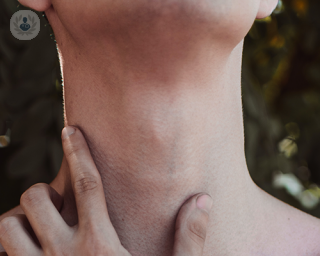

Do you have a goitre? Symptoms, diagnosis and treatment
By Mr Radu Mihai
2024-11-21
Mr Radu Mihai shares his professional expertise on the causes, symptoms and treatment of goitre. See more


What are the main signs of fatigue in children?
By Dr Martin Gray
2024-11-21
This article below examines the different parts of fatigue in children, as esteemed consultant paediatrician, Dr Martin Gray, explains all we need to know about fatigue in children. See more


Voice changes after thyroid surgery: Does thyroid hoarseness go away?
By Mr Radu Mihai
2024-11-21
After thyroid surgery, your voice could change for several reasons. In some cases, voice changes are temporary and in other cases, they are permanent. Does thyroid hoarseness go away? Mr Radu Mihai provides you with an in-depth guide on the potential voice changes you may experience, what can cause them and much more. See more
Experts in Thyroid
-
Dr Rakesh Amin
Paediatric endocrinology, diabetes & metabolismExpert in:
- Thyroid
- Diabetes
- Childhood obesity
- Puberty disorders
- Growth disorders
- Adrenal gland disorders
-
Dr Rajiv Goonetilleke
PaediatricsExpert in:
- Abdominal pain
- Asthma
- Bedwetting
- Thyroid
- Growth disorders
- Urinary tract infections in children
-
Professor Luigi Gnudi
Endocrinology, diabetes & metabolismExpert in:
- Diabetes
- Diabetic nephropathy
- Cardiovascular Medicine
- Obesity
- Lipid disorders
- Thyroid
-
Dr Siva Sivappriyan
Endocrinology, diabetes & metabolismExpert in:
- Diabetes
- Thyroid
- Diseases of the pituitary and hypothalamus
- Parathyroid gland
- Obesity
- Hormone therapy
-
Professor Miles Levy
Endocrinology, diabetes & metabolismExpert in:
- Pituitary tumours
- Adrenal gland disorders
- Thyroid
- Parathyroid gland
- Menstrual disorders
- Hypogonadism
- See all

Great Ormond Street Hospital
Great Ormond Street Hospital
Great Ormond Street. WC1N 3JH
No existe teléfono en el centro.
By using the telephone number provided by TOP DOCTORS, you automatically agree to let us use your phone number for statistical and commercial purposes. For further information, read our Privacy Policy
Top Doctors

HCA UK at The Shard
HCA UK at The Shard
32 St Thomas Street, SE1 9BS
No existe teléfono en el centro.
By using the telephone number provided by TOP DOCTORS, you automatically agree to let us use your phone number for statistical and commercial purposes. For further information, read our Privacy Policy
Top Doctors

Consult-ENT
Consult-ENT
BMI Chaucer Hospital, Nackington Rd, Canterbury, CT4 7AR
No existe teléfono en el centro.
By using the telephone number provided by TOP DOCTORS, you automatically agree to let us use your phone number for statistical and commercial purposes. For further information, read our Privacy Policy
Top Doctors
-
Great Ormond Street Hospital
Great Ormond Street. WC1N 3JH, Central LondonExpert in:
- Cancer
- Paediatric neurosurgery
- Paediatrics
-
HCA UK at The Shard
32 St Thomas Street, SE1 9BS, Central LondonExpert in:
- Vascular Surgery
- Head and neck cancer
- Breast Cancer
- Orthopaedic surgery
- Thoracic Surgery
- Cancer screening clinic
-
Consult-ENT
BMI Chaucer Hospital, Nackington Rd, Canterbury, CT4 7AR, CanterburyExpert in:
- Voice disorders
- Blocked nose
- Ear infection
- Dizziness
- Paediatrics
- Hearing loss
- See all
- Most viewed diseases, medical tests, and treatments
- Migraine
- Paediatric rheumatology
- Autoimmune diseases
- Joint pain
- Child nutrition
- Nutrition
- Weight loss injections
- Abdominal pain
- Minimal access surgery (keyhole surgery)
- Head and neck cancer
